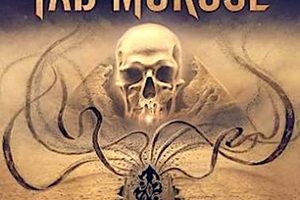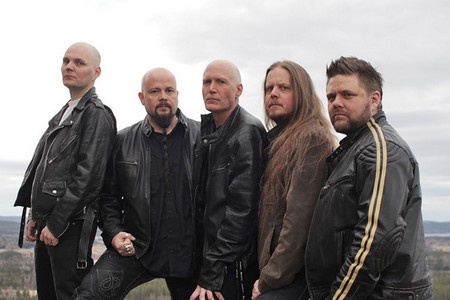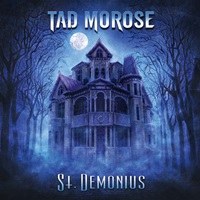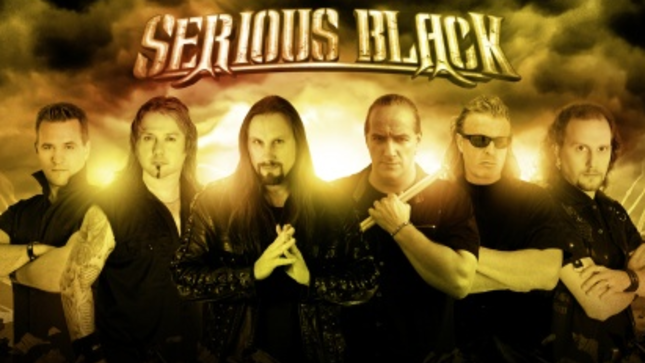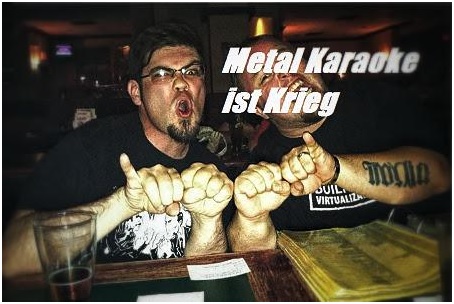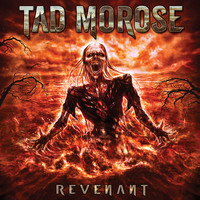Tad Morose – Live for the Music
Friday, 22nd June 2018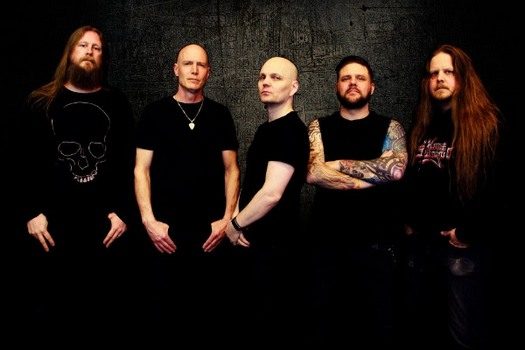
Deep into their career, Tad Morose continues to put the focus where it should be- on their music. Chapter X as the latest album breaks conventional logic – including 14 songs and over an hour of new material to consume, just because the tunes are that strong. The quintet loves heavy metal – sometimes doomy, definitely in a power/traditional mold, but all about sticking to the principles that they’ve vaulted from since their early 90’s beginnings. It’s too early to tell where this record will sit in the career discography that contains A Mended Rhyme, Undead, and Modus Vivendi – but at this point, it’s hard to dispute the quality that pours forth when checking into these songs.
Time for another discussion about all things Tad Morose with guitarist Christer Anderson. His soft-spoken, laid back personality makes for some interesting answers – as you’ll discover here. We tackle everything from a new record label, new bassist, and last minute cover art scrambling, to the state of live support for European bands getting to the states as well as future plans for the group.
Dead Rhetoric: The latest record Chapter X signals a few changes as far as a new record deal with GMR Music plus latest bassist Johan Löfgren entering Tad Morose. At this point, what do you aim to achieve through each studio album to reach a level of satisfaction after being active with the band since 1991?
Christer Anderson: That’s a tough question. You always try to do your very best- at first to satisfy your own desires. When you’ve done an album and you listen to it, it’s kind of like you could have done that better and so you try harder for the next album. It’s trying to please ourselves in the first place, and if the other people like it, that makes us even happier. It didn’t work out as well as we expected with Despotz Records, we knew it was time for a change. We’ve known the people at GMR Music for quite some time, before we signed with Despotz we had some talks with them – so the timing was right. We got an offer we couldn’t refuse.
Johan is a very talented musician and a great bass player. We’ve known each other for quite some time, and Ronny grew up with him – he’s been involved with Tad Morose more or less through the years. He and Ronnie mixed the last two Tad Morose albums, it was a quick decision. We were entering almost in mixing mode with Chapter X and we had not received any bass files from Tommi. We had a talk and the decision was made to have him not play on the album. Johan had only a few evenings to lay down all the bass tracks and he did a phenomenal job. After that, as you might expect, we asked him to join the band. He said okay.
Dead Rhetoric: It seems like there are a couple of spots where the vocals expand into heavier/extreme terrain, especially “I Am Night”, “Slaves in the Dying Sun”, and “Turns to Dust”. How did you entertain the ideas of moving beyond the conventional melodic heavy metal/clean approach and incorporating these darker nuances without sacrificing the essence of the band and these songs?
Anderson: I don’t really know. The vocal lines are solely done by Ronny. He as well as the rest of the band always try to push ourselves to try different things. It’s more obvious if you change the vocal style by throwing in some growls. I can only do so much on the guitars. We keep a variation in things, to make it more interesting for ourselves and the listeners. If there is a part in the song and it calls for some aggressive vocals, he goes for the feeling. If he feels like singing in a cheesy and more melodic way, he will do that. It always turns out great, if you ask me.
Dead Rhetoric: You mentioned that when it comes to the guitars, there’s only so much you can do. Have you been conscious of trying to keep up with technology and the production/tones through the years?
Anderson: As a guitarist, you are kind of a nerd in your own way. You keep your mind on new stuff that comes out, not about the actual playing but more about the equipment. It’s a material sport to be a guitar player. We use the latest equipment that is available because we are so interested in it, I don’t know if we’ve succeeded but we do it because we like doing it.
Dead Rhetoric: Do you enjoy the process of recording at home with studio equipment versus going away and recording on the clock in a professional studio?
Anderson: It’s a two-edged sword. The early albums, we went to the studio, the first album we recorded in a week and the second album we stayed there for five weeks. We literally slept on the floor of the recording studio. We lived and breathed music all the time. There’s a sort of charm about that, because of a tried and true spirit about those records. I kind of miss that. Nowadays we are older with houses, kids, jobs – it’s very convenient to sit down in your basement and be able to do your own thing, send it back and forth through Dropbox to listen to. It takes more time to do a record like this, as it looks now in our personal lives there’s no other way that we could do it. There’s not that much money in the music business, so you have to do this as cheaply as possible, this is the way we have to do it.
Dead Rhetoric: The record clocks in at an hour – can you discuss the challenges of creating a dynamic record that can keep the listeners interest for 14 songs top to bottom? Does this mean you really hone in on mood/tempo balance track to track so as to not exhaust the aural experience time after time?
Anderson: (laughs). I don’t know what to answer. I’m probably going to disappoint you here. A lot of bands write a lot of songs – let’s say they write 20 songs and 12 songs end up on the album. For us, every song that we write tends to end up on the album. The same with this album – we had 14 songs, and that’s how it turned out. We recorded them, and then we thought about the fact that this would be too long for an album. Perhaps we should take away 2-3 songs- and then we couldn’t decide which songs we wanted to take away. The record company thought this was going to be too long- especially when it comes to putting this out on vinyl, it’s too many songs to have on one album. It needed to be a double album, and that’s very expensive. They came back to us and decided it was going to be double vinyl, because the songs are all great. We did what we felt like doing. It’s up to the listener to decide if some of the songs are fillers or whatever. We think every song, there’s a reason that the songs are on the album.
As far as the order of the songs on the album, we couldn’t agree. It was in alphabetical order, so that could be seen as lazy and convenient. It turned out nice and a bit weird. We start the album with the longest song “Apocalypse”, and that’s not usually what you do – and we end the album with the slowest song “…Yet Still You Preach”, and that’s not what you are supposed to do either.
Dead Rhetoric: What can you tell us about the cover art for this album?
Anderson: This is a fun story. We thought we were going to use the same artist that did Revenant and St. Demonius, a girl living in Norway (Isis Sousa) – but she was too occupied and we are last minute type of guys. If we had given her a call a bit earlier, she could have done it- but being last minute, she couldn’t. Damn – what do we do now? Let’s check with Rainer (Kalwitz), who did the cover for A Mended Rhyme. I think we had ten days before we had to send (the art) to be printed. He had some stuff that was laying around that had not been used- there was a lot of stunning work but it had already been made and didn’t feel really good.
After a while he told us there was one other thing he was working on, he had no plans for it and he sent me a picture of the sketch. Can you finish it seven days? He said it might be tight, but that he would give it a try. We sent him the music for inspiration and he just kept on doing it- and we received it on the very last day. A bit weird and not the way you should do it, but kind of exciting for us to do everything at the last minute, as we really didn’t know how things would fall into place. It turned out very well.
Dead Rhetoric: How important do you believe band chemistry is at this point for Tad Morose? Do you believe that you are all on the same page as far as where you see the band moving creatively and professionally?
Anderson: Yes, I really think so. We really get along very, very well – usually a bit too well (laughs). Whenever we go out and play live shows, we usually have a little bit too much fun so to say. We need to take care and put the focus on the playing. It can very easily get out of hand- there’s a great chemistry.
Dead Rhetoric: Now that you have three albums with Ronny on vocals, does it make things easier or still difficult to decide how to develop the best Tad Morose setlists when performing live – as I would imagine there are a lot of long-timers that still want to hear the material of the Kristian Andrén and Urban Breed eras?
Anderson: Yes, it is. This is our tenth release so far- well over 100 songs, so it’s hard to put together a set list. I don’t know if we are just lazy to focus more on the newer stuff- but sometimes you get only 30 minutes on stage at a festival and it’s really hard to please everybody. You can throw in more older songs with a longer set – with an hour and a half or more. It’s hard to decide what songs to play live out of the older songs- as a guitarist I may have my own favorites, but then talking to people in the audience they like songs that the musicians may like the least. It’s really weird. We try our best, but it’s hard to please everybody. We are always talking about throwing in some really old stuff, but it’s always down to the amount of time that we get on stage as well.
Dead Rhetoric: Scandinavia has a potent metal scene between the three countries of Norway, Sweden, and Finland – do you believe there are distinct qualities that illustrate why there have been so many talented bands in all the sub-genres making a global impact through their records and touring?
Anderson: I don’t know. I think people up here in Scandinavia are very determined. It doesn’t matter if they are ice hockey players or guitarists or musicians in general. They know what they want and spend a lot of time to achieve their goals, and nothing will stop them. There’s not really much else to do around here- plus we have those long and cold winters, not much else to do but to sit inside and practice whether it’s ice hockey or music.
Dead Rhetoric: What countries do you see as having the best appeal for Tad Morose- are shows getting better in your home country of Sweden or do you find that you have to venture to other parts of Europe and the world to have a better following?
Anderson: Sweden has changed the last 5-6 years. Before that, it was very much that the Swedish audiences didn’t like Swedish bands due to envy or whatever. So you would get a much better response if you were playing in other countries like Germany, Holland, Belgium. The Swedes are getting along- the last couple of years when we’ve played here, it hasn’t been much different as to playing those other countries. Now it’s been a very long time since we’ve played in America- 10 to 15 years ago. We would really like to get back there, but I don’t know if they would like for us to play there now.
Dead Rhetoric: I think you would be pleasantly surprised if you made another trip to the United States to play…
Anderson: As a European band entering the USA to play live, it’s no easy journey. You have the whole visa crap, it costs a lot of money to have the paperwork in order to go there. It’s really hard to make it work financially. For an American band to come over to Europe and play, it’s just buy the damn airplane tickets to get over here. I don’t know what Americans are afraid of – it seems like the government thinks that everyone who is not an American coming over to the country is a terrorist or something. We are not that- we just want to play music, drink a few beers, and have a good time.
I’ve seen the pile of paperwork that needs to be filed for the government to get approved for the visas- and it’s just ridiculous. Run a check on all the band members who are criminals- that is fine, but it shouldn’t be needed to make this huge pile of paperwork. You still don’t know if you are allowed to enter or not – you have to book a show before you send out the paperwork, but you don’t know if it’s been approved or not in time to do the show. It’s a catch-22 on the whole thing.
I have some friends on Facebook who do this for a living. They can say certain things are missing, but the guy who was supposed to check the paperwork doesn’t do things correctly, so then the tour has to get cancelled. You can’t really argue with them either. It’s ridiculous I think.
Dead Rhetoric: Do you have a favorite failure when you look back upon your personal life or music career, that in retrospect set you up for a future success down the line?
Anderson: No, not really. As the saying goes… I don’t know how to put it in English. If you want something really bad, you have to give it everything. If you give it everything, you get everything back. It’s really hard to give it everything, it means literally everything to make it. I have kids, so I can’t give it everything. When you look at what we’ve done over the years, and what we haven’t done, I couldn’t really have done it any other way. You always wish you could make a living out of music, but then I thought it’s really pretty nice to not make a living out of music – I have my day job, and I can do whatever I want with the music. I don’t have to worry about if an album sells well or not- unlike some bands that depend on things financially. You have bands that put out great albums, they don’t sell, and then it’s hard for them to even eat- of course, they are following their dream. It’s nice to have music as your hobby, because we can do whatever we like.
Dead Rhetoric: Does that mean how you look at success is different today than it was when you first started the band?
Anderson: Yes, of course. We thought like perhaps many other musicians that the day you sign your first record deal, you would be a millionaire and that work life would fuck off because you are a rock star now. And the day came, we signed a record deal, we thought we were on a roll – and nothing happened (laughs). That was an eye opener.
Dead Rhetoric: Considering your vast collection of music and love/appreciation for metal, what qualities do you think make for a timeless record in your opinion?
Anderson: It has to be good songs by a good band, good production. Everything has to be top notch to be a successful album. It’s really hard, you really don’t know until you just listen to it. I’m old, let’s say Heaven and Hell by Black Sabbath, that’s a top notch album for me. The first Crimson Glory, and Transcendence – those are top notch albums. It just makes me feel good, and I listen with my stomach.
Dead Rhetoric: Knowing your love for King Diamond and specifically the Abigail album, how special was it to travel to the UK to witness the anniversary show with the record performed in its entirety – as I understand you travelled to the show with members of Morgana Lefay and met up with Chris and Nicky of Shadowkeep among others?
Anderson: That was a very nice trip. It was the UK, so it was supposed to rain all the time we were there but the weather was great. We talked to Pontus the guitarist from Hammerfall, he also does the sound for King Diamond live. We met up with some musician friends, had a crazy amount of beer and a good time. The show was awesome. The venue they played is known preferably by sound guys as a nice venue. Everything was top-notch, the performance, the venue, and we had a very good time in London. King quit smoking and it really helped his vocals. It’s nice to see him live, he sounds very agile and powerful. I’ve seen him live back in the day, if he had a good day he was good, if he had a bad day he wasn’t so good- we didn’t care back then, it was King Diamond! He really delivers now.
Dead Rhetoric: What’s on the horizon for Tad Morose when it comes to supporting this record?
Anderson: We have a few shows coming up here in Sweden for starters, and something in Greece in late autumn. There will be a lot of shows- as for a lot of other bands, playing live is our engine so to say to music. Recording an album, it’s fun- at least myself I do this to have some new songs to go out and play live because that’s so much fun. It’s hard to explain to someone who doesn’t play in a band how much fun it really is to take some crazy guys and crazy crew members and hop on a bus forever to make a riot and play live. I can’t really explain it, it’s just awesome.











